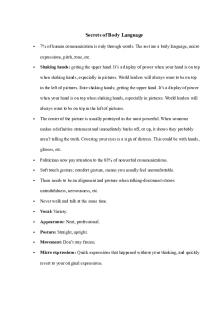Judgmental and emotive language PDF

| Title | Judgmental and emotive language |
|---|---|
| Course | Language in legal context |
| Institution | North-West University |
| Pages | 2 |
| File Size | 148.6 KB |
| File Type | |
| Total Downloads | 60 |
| Total Views | 135 |
Summary
Understanding and analyzing emotive language...
Description
Judgmental and Emotive Language The difference between the kind of opinion expressed in an academic argument and biased opinion is that academic thesis statements m us t b be e ssuppo uppo upporr te ted d by ev evii d en ence ce considered authoritative in the academic community. The evidence must come before the analysis. So in academic writing, the ideal writer is someone who, after car ef eful ul examination of al alll available evidence, comes to an impar tial position. The “impartial judge” is the idealized model of how an academic writer goes about his/her business. As a result, in academic writing, the convention is that arguments should imply impartial and sound judgment through the use of rational, impersonal and unemotional language, however passionate the author is about the position he/she is arguing. To achieve an impersonal, objective tone in your writing, it is essential to avoid: Ø Judgmenta l Language Definition: Language that reveals that the writer is making a personal judgment. Using judgmental language makes the writer appear as if she coming to her conclusions based on previously-held beliefs and values, rather than letting the evidence be support for the argument. For example, a thesis would not be considered judgmental if accompanied by a justification based on evidence. Exam ples I believe need to
I feel It is good
I conclude It is bad
it seems It is right
I think It is wrong
should
Ø Em otive Lang uag e Definition: L anguage that appeals to the reader’s emotions or values to make an argument. While this type of language might be persuasive, it does not ask the reader to consider the evidence on its own merits, but rather loads the argument with emotion in an attempt to incite an emotional reaction in the reader. Exam ples History has provided us with g r eat heroes. The abandoned children were found on the street.
The br ave man risked his life to save the orphan. The intelligent woman was successful in her career.
Exampless Judgmental and Em otive Lang uag e Example elf befor e other ss. I feel that I strongly believe that a tr ue her o never think s of his/her sself Jessica Lynch definitel definitely y h ad to endur e toug tough h tim es but I also feel tha t her rescuers and the m en aand nd wo wom m en who have died in Iraq are the ones who should be called heroes, not her. Her rescuers received little to no cre dit for her getting Pfc. Lynch hom e in one piece piece, but it is this ever yday cour ag e we can see here that makes our armed forces what they are today.
Imperso nal and Objectiv e Exam ple While Jessica Lynch has been portrayed by the news media as a hero, comparatively little media attention has been given to her rescuers and to others who have died in Iraq, many of whom have arguably endured more hardship and contributed more to American military efforts than Pfc. Lynch. If a “hero” is defined as one who endures hardship for the benefit of others, these soldiers might arguably be more deserving of the title than Lynch.
Exer cises ffor or Judg m ental and Em otiv otive e Lang uag e Rewrite the following sentences (taken from student papers) to eliminate the judgmental and emotive language. 1. I think that the film does correctly portray Bush and his tactics. The facts shown are indisputable and cannot be pushed aside. I believe that everyone should see this film and take a hard look at the facts. You can’t dismiss it.
2. People's opinions are so malleable and easily influenced by the media that misrepresentations of certain concepts or individuals are very dangerous and damaging. Unfortunately, many times the newspapers, films, and books people are exposed to are indoctrinating and therefore misrepresent concepts by depicting them in a prejudiced manner. The most blatant medium of biased writing is propaganda literature....
Similar Free PDFs

Judgmental and emotive language
- 2 Pages

dialect and standard language
- 6 Pages

Language and Communication
- 6 Pages

Speech and Body Language
- 2 Pages

Language and Human Nature
- 5 Pages

Language Thought and Culture
- 39 Pages

Language AND Society Finals
- 4 Pages

Language and identity
- 7 Pages

Lacan Language and Philosophy
- 231 Pages

Language Varieties and Registers
- 3 Pages

Language and Thought
- 2 Pages
Popular Institutions
- Tinajero National High School - Annex
- Politeknik Caltex Riau
- Yokohama City University
- SGT University
- University of Al-Qadisiyah
- Divine Word College of Vigan
- Techniek College Rotterdam
- Universidade de Santiago
- Universiti Teknologi MARA Cawangan Johor Kampus Pasir Gudang
- Poltekkes Kemenkes Yogyakarta
- Baguio City National High School
- Colegio san marcos
- preparatoria uno
- Centro de Bachillerato Tecnológico Industrial y de Servicios No. 107
- Dalian Maritime University
- Quang Trung Secondary School
- Colegio Tecnológico en Informática
- Corporación Regional de Educación Superior
- Grupo CEDVA
- Dar Al Uloom University
- Centro de Estudios Preuniversitarios de la Universidad Nacional de Ingeniería
- 上智大学
- Aakash International School, Nuna Majara
- San Felipe Neri Catholic School
- Kang Chiao International School - New Taipei City
- Misamis Occidental National High School
- Institución Educativa Escuela Normal Juan Ladrilleros
- Kolehiyo ng Pantukan
- Batanes State College
- Instituto Continental
- Sekolah Menengah Kejuruan Kesehatan Kaltara (Tarakan)
- Colegio de La Inmaculada Concepcion - Cebu




